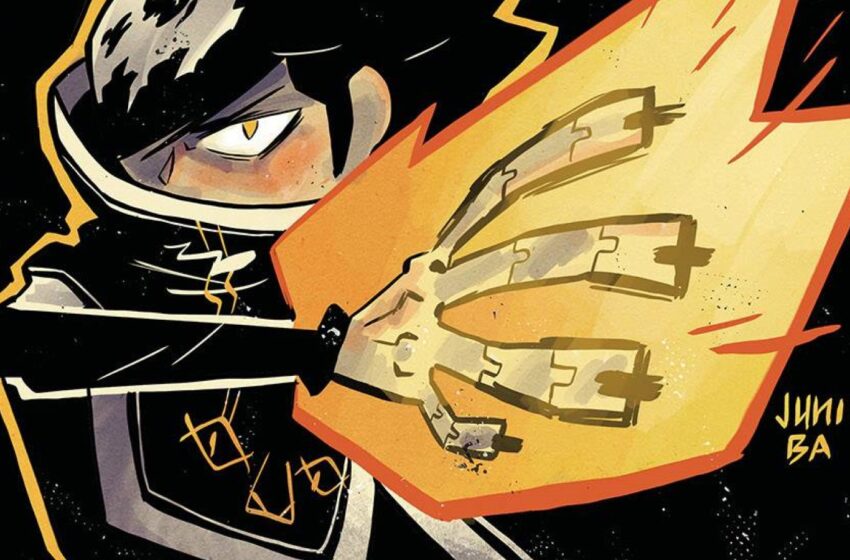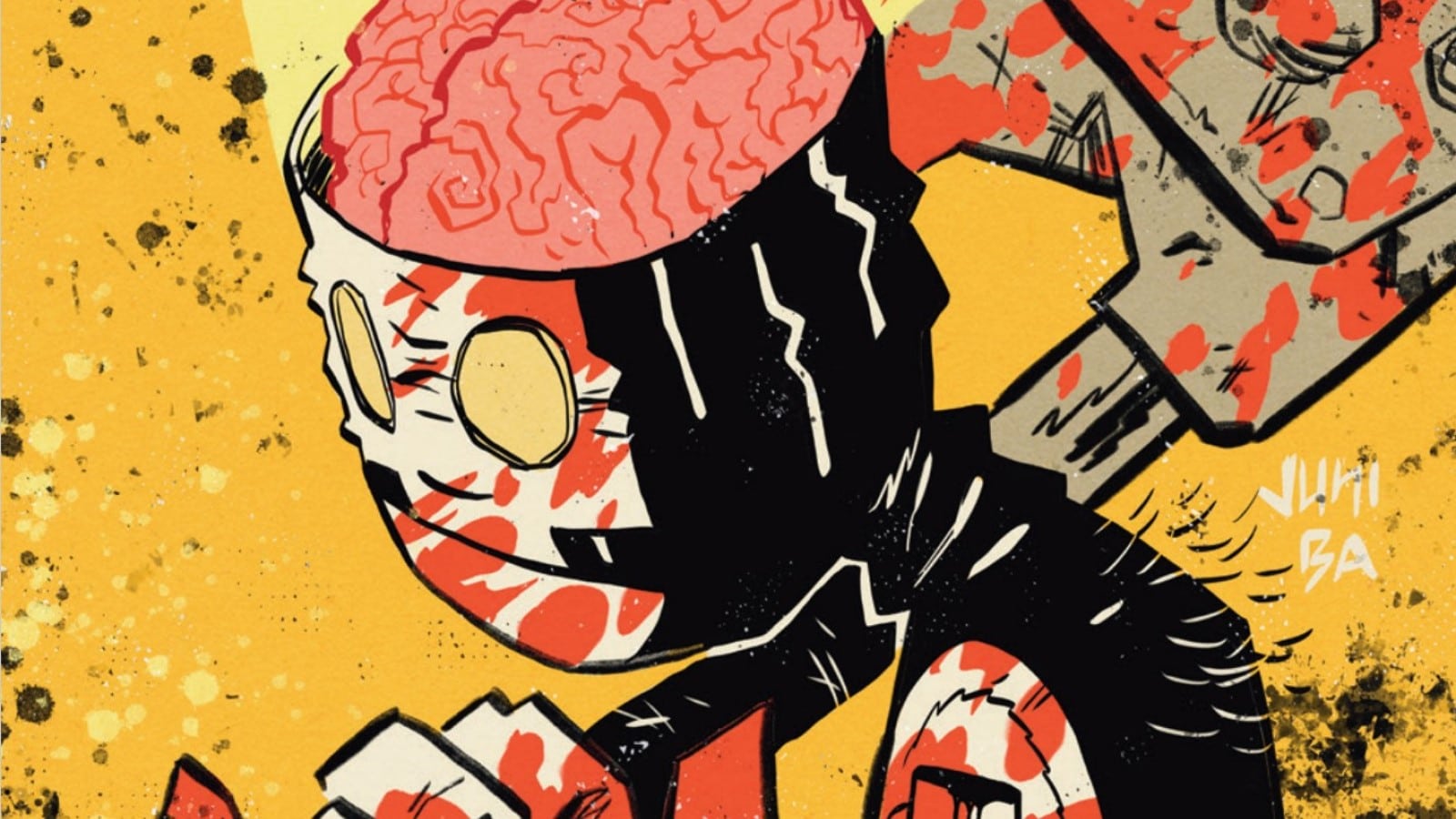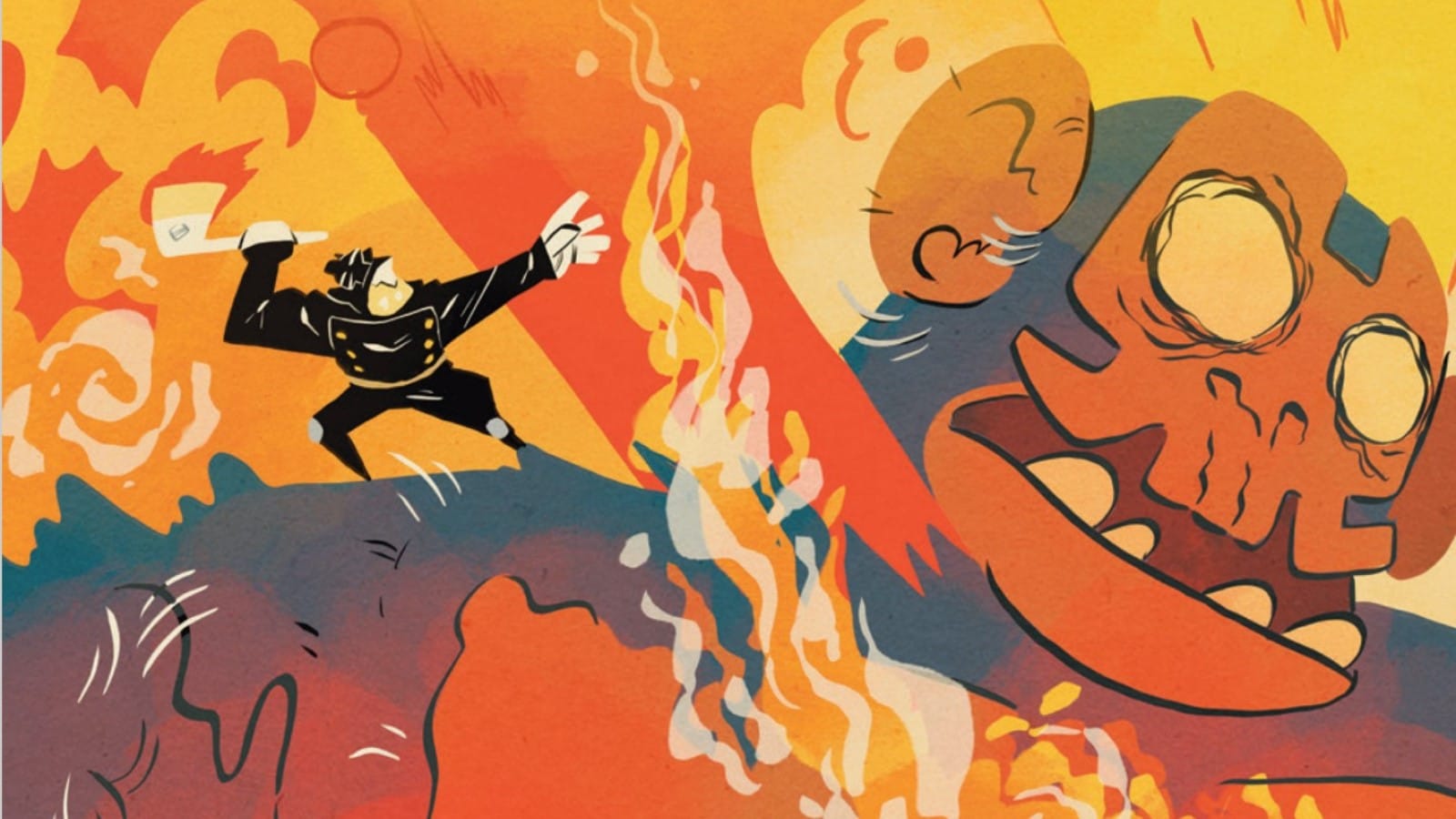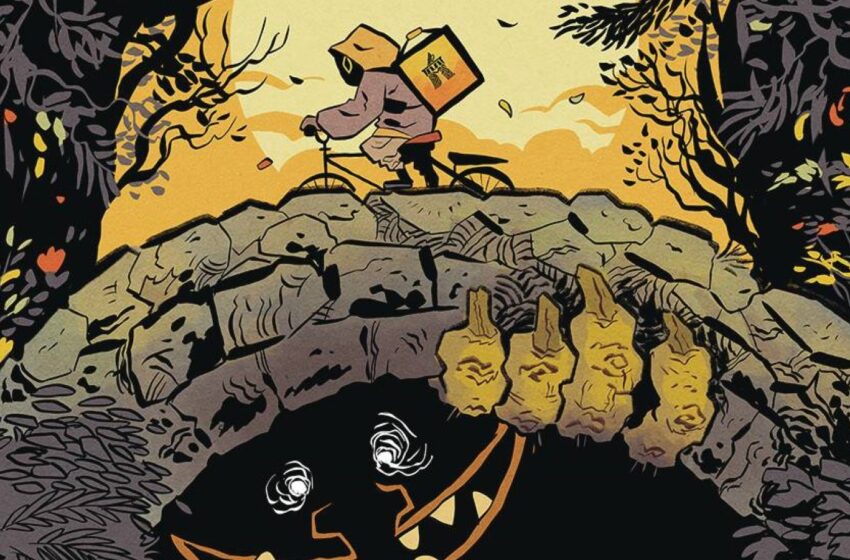Young Haricot has been done a terrible injustice by a citizen of Monkey Meat Island! In fact, one could say Haricot has been done injustice all his life. A chance meeting with a Dark God bestows Haricot with power unimaginable — and now all those who stand in their way must pay a steep price! After all, how else is the Monkey Meat Company supposed to make a profit? Monkey Meat #2 is a Juni Ba creation (with special authorization from the Monkey Meat Company).
Armaan Babu: My name is Armaan. It means “longing” in Hindi! I don’t look like much, most people don’t notice me. I don’t think they expect much from me … but, fortunately, I have my own Dark God of Writing Prowess here with me, and with our powers combined, we shall be a force to reckon with!!
But before we get to anything else, answer me this, Dark God Ritesh: This issue. This is manga stuff, right? We’re playing with manga styles of storytelling here?
Ritesh Babu: Yeah, though specifically Shounen Action is the big one riffed on more than any other. “King Saru,” the comic book being read within the issue, is a blatant double-riff on both Dragonball and Naruto all at once. “Saru” means monkey in Japanese, and Son Goku (the lead of Dragonball) is the Japanese reading of Sun Wukong, The Monkey King, who is featured right on Page 2 of this issue! (It’s been a hell of a week for The Monkey King between this and The Monkey Prince #1.)
We see King Saru with that Konoha-headband from Naruto, and we see the magic staff (which Goku also has) clearly evoking Wukong’s Ruyi Jingu Bang staff. There’s a lot more, but yeah, there’s a lot of manga love in this one, for sure.
Armaan: Excellent. You are now assigned to the Department of Noticing All the References. Delegation! To the review!
I’m really enjoying the bright, cheery sense of silliness there is to everything in this comic. Every single panel has its own little gag, and sometimes that gag is the sheer earnestness of the thing being parodied — in this case, our hardcore manga fan, Haricot. Like many self-deprecating nerds desperate for attention — and a fair few protagonists I’ve seen in the few anime series I have seen — Haricot wants to draw attention to how ordinary he is. How he’s never going to amount to much, and how the world piles on by being extremely unjust toward him. He is a Nice Guy, and he wants your pity.
Ritesh: And he sees himself in his heroes, like King Saru. He feels great catharsis from the consumption of this story, this “shounen” tale aimed at young men like him.

Armaan: If you couldn’t tell from the intro, as harsh as I’m being, I saw a little of myself in Haricot, too. There’s a lot of very basic relatability here — everyone aspires to be the hero. But heroes need an origin story, and in some ways … it can be tempting to want to paint yourself as a victim, too. Both dreams place people like Haricot right at the center of their universe, which is the danger here.
Ritesh: Haricot’s is a familiar story. It’s the story a lot of people tell themselves. It’s a story a lot of people might see themselves in. There are kernels there of possibility, which don’t go where they should. I think it’s really telling that we have Wukong as an opener for the issue. Wukong is the basis for the modern shounen action hero. He’s how you get your Goku, which is how you get your Naruto or Luffy or Gon and plenty more. And Wukong’s story is this very grand, mythic tale wherein he must actually LEARN and grow and change from who he has been. And the change is viewed as a healthy, positive thing. Here, what we see is what power does to one who is unable to actually change.
Armaan: I think it’s important to consider the source of Haricot’s empowerment. We can all agree that nothing healthy comes from a soda can, and if it’s got a self-professed dark god thrown into the mix? It’s a double-down on deviousness.
After a chance encounter with one of Monkey Meat Island’s residents leaves Haricot beaten up, after a lifetime of continual failures, Haricot’s at his lowest point, where he meets an unnamed dark god who claims he fell into a can by accident. The comic, however, shows this god and the powers he offers to be a bona fide Monkey Meat licensed product (and it’s not the first time they’ve been shown to have influences over godly realms).
Haricot wants to take down Monkey Meat Multinational, but using their own power to do it isn’t the greatest of ideas.
Ritesh: I think the key is that he actually doesn’t. He just says it, much like he says a lot of things evoking the kind of heroic figures he’s seemingly emulating. What Ba does here is lay bare the fundamental nature of how power affects certain people, even those who seemingly say they’d use it a certain way or want it for noble reasons. The shounen hero is typically an underdog loser of some kind who ends up a fated champion of grand power. It’s a story Haricot knows and loves and leans into, considering himself the embodiment of that wish fulfillment fantasy. But that fantasy is in the end revealed to be just that, a fantasy. Haricot doesn’t actually want power to do the right things. He wants power to hedonistically fulfill his urges. Having felt small all his life, he wants to lash out and hurt all others, in order to feel big. He’s an insecure little boy who wants to “get back” at the people who bullied him or the women who rejected him. But he also somehow sees doing that as “heroic,” as just what needs to be done. As him dealing with “injustice.” He self-mythologizes and makes himself the hero of the universe, reducing others, in order to justify his monstrosity and insecurities. It’s a … fairly accurate depiction of how a lot of nerds deal with power.
We live in a world where they say “The nerds won!” And so they did. But you look all over, and it seems like legions of Haricots hold power far too much than not. Little men who really have not worked out their issues and throw their bullshit onto others.

Armaan: It’s a unique kind of monster we have here. Because it’s one thing to lash out when you have power — it’s another thing entirely to believe you’re heroic in doing so. We have both elements pretty clearly defined: the petulant dark god, pure power and fantasy perfectly packaged. And the nerd who believes in heroism, who sees life as a battle and who believes the simple act of fighting back justifies any collateral damage.
The two complement each other. At no point does it feel like the dark god is a corruptive influence, they’re both just different facets of one empowered horror.
Which brings us to the big fight scene, which is absolute gold.
Ritesh: Yeah. The action is very kinetic and evocative of the Shonen action comics that it’s so steeped in. I love all the fun SFX and dynamism Ba is able to inject into the whole thing while keeping clarity and maintaining his style. It’s a delicate balance wherein while it is drawing from that school of comics, it doesn’t also read just like dull homage or pastiche. It feels like it’s using that to augment its own unique, distinctive style.
Like, the cloak that Haricot wears. It’s so clearly evocative of the sort of Akatsuki-esque cloaks from Naruto for instance, but it never feels like just a catch-the-reference. It’s just playing with those sort of aesthetic interests while making it all wholly its own. And that’s great fun.
Armaan: It really feels like the beginning and end may be poking fun at this style of storytelling — even the dialogue in this fight scene continues to do so — but for the fighting itself, Ba plays with these storytelling tools in earnest. The fight brings in a lot of yellows and oranges to the pages’ blacks and whites, highlighting the pure power sources that both our opponents are bringing to the field. Ba’s cartoonish styles pair well with the irregular lines we see in the blurs, in the scenery breaking apart, but most importantly, in the sound effects. Sound is drawn so prevalently on the page that punches get to break it apart. The energy coming off the panels in these scenes is palpable. I can almost feel the tremors.
Ritesh: It’s tremendously fun! I have to admit, the whole “Let’s screw with the hero myth, specifically the shounen hero myth” of it all, it took me back to two of my other favorite instances of that idea. The first is from Yoshihiro Togashi’s Hunter x Hunter, wherein he does it less in this sense and just earnestly lets that sort of classic Goku journey play out and unveils the true horror of that, with the most bone-chilling moment riffing on the iconic “Super Saiyan” transformation.
The second is this legendary skit by Cilvanis:
One’s brutal horror and the other’s a hilarious comedy, and this kinda falls squarely in between the two for me.
Armaan: That’s the line this comic walks well, doesn’t it? Brutal horror and hilarious comedy. Although for this issue, it feels less like some of the horrific stuff we saw last issue, it’s more … brutally mean for a certain kind of fan.
The hugely hilarious bit for me, though, was when our good friend Lug more or less ends the drama of the fight by taking a look at the “difficulties” Haricot has gone through and just says, “Wait. That’s it?”
It’s after pages of escalating power punches, of wild energy engulfing the page, as Haricot takes on a new, deadly, edgelord name — The Predator — it’s all really just a bit … petty. That’s what angers Lug more than anything. The pettiness. And he can see it clearly enough to be able to hit Haricot with a harsh dose of reality before a representative for MMM comes along to crush all of our collective souls.
Soul crushing endings for an anthology is a fairly new concept for me, but it’s one I think I can get behind.
Ritesh: Hah. I think the thing that gave the issue its real sense of poignancy, and what broke my heart, was Lug desperately PLEADING with Haricot to be better. To learn. To grow. To change. To not become like him. Because Lug knows what it’s like to be enslaved to this corporate machine. And he’s practically begging Haricot to just look around himself and see what he’s doing and what he really wants. It’s maybe the most genuinely selfless act, and one from true care and empathy.
But none of it matters. It’s all a waste. It all falls on deaf ears. Lug’s callout of “Get over it” is the right advice, because look, we all got bullied, but we all also have to learn from that and move on, rather than fixate over it as adults unhealthily. But just … Haricot is not a man able to move forward. He’s still a child incapable of growing, and so the moment the Monkey Meat deal promising him violent vengeance and the power of armies shows up? He’s DYING to sign that contract and serve. That is his true essential nature. Power corrupts. Even ultimate, liberatory power in the hands of people like Haricot is wasted, as they’ll always sell themselves away and over to scumbags like the agent of Monkey Meat.

Armaan: It all comes back to the source for me. We read the kinds of stories that Haricot idolizes because we believe that power doesn’t always corrupt, that it can be used to make the world better. Haricot’s power, however, came from MMM itself. It’s a tainted source, marketed to the desperate. There was never going to be a happy ending here.
Power does more than corrupt, though. It, like our dark god, is desperate to be used. And that’s what MMM sees — naive, ignorant power that has no idea where to be directed. It silences the one voice that could direct it toward good, and puts Haricot in charge of MMM’s armed forces. I imagine a part of Haricot knows, by this point, that he’s becoming the oppressor he told himself he hated. I just don’t think he cares.
Ritesh: He does not. Part of what’s harrowing there is by the end the agent takes Haricot to this whole room full of entertainment media figures/IP that many who serve Monkey Meat evoke for content purposes. You see everyone from Superman to Morpheus from The Matrix here. And there goes Haricot, another piece in this game set, to help drive up the profits of the corporation. It’s not quite the grand purpose or catharsis Haricot hoped for. It’s just … empty and disappointing and depressing. That’s the thing, that’s what it is, ultimately. That’s all this stupid deal does. It makes you a chump for the money-making of dipshits above.
Armaan: It makes you more than a chump, Ritesh. I’ve just realized something that’s ruined every soul-crushing ending this series will have plus that one that’s come before. MMM? It makes a monkey out of you.
Hee.
Okay, that terrible but glee-inducing joke aside, I have to say, I really enjoy the relationship Lug has with the MMM representative. It’s a cynical but open, honest-ish relationship. Lug’s clearly fine with expressing his heartache-inspiring disappointment to the guy. We don’t get the all-consuming horror ending of the last issue. Just quiet, graceful disappointment. The big corporation wins again, and all that’s left is tiredness. There’s only one kind of solace that can be found here: the hollow comfort of giving up on the idea that the world can be a better place.






